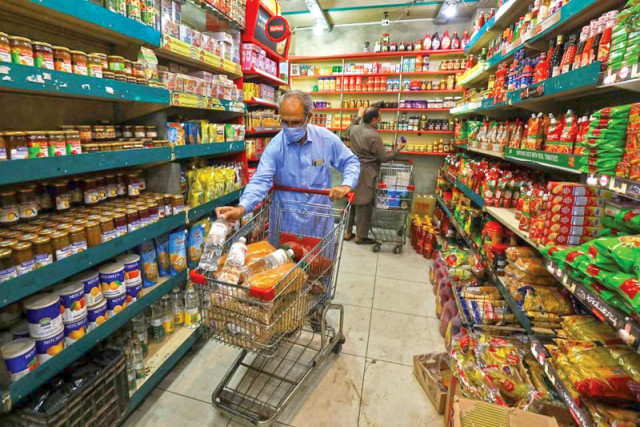Is it time for a food system reset in Pakistan?
Despite increase in overall levels of food production, number of food-insecure people is on rise

While Pakistan has been blessed with agriculture resources, they are consistently strained due to demographic pressure, the impact of climate change, encroachment of arable lands, soil erosion, water shortage and lack of focus on productivity. Despite an increase in the overall levels of food production in Pakistan, the number of food insecure people is on the rise, in parallel with nutrition related challenges such as the child stunting and anaemic growth, particularly among women. Until the full impact of the floods are measured properly, the availability of food may not be an issue but access to food, particularly healthy diets, is a serious issue for a large segment of the population.
The recent floods, in context of the aforementioned structural issues, have hampered the agriculture system of Pakistan quite significantly, posing a serious threat to food security in the short to medium term. According to a survey conducted in October 2020, approximately 40 percent of Pakistani households were facing moderate to severe food insecurity. The floods may have exacerbated this significantly.
Independent of the effects of natural calamities, the food system in Pakistan needs to be reset, in order to make it more efficient, inclusive, resilient and sustainable.
This may, however, give us a good opportunity to trigger a food system reset, amidst the flood recovery and restoration phase.
Firstly, to make the food system more efficient, we need to focus on enhancing productivity through the deployment of innovation and technology, adopting efficient practices such as multi-cropping. Support towards better prices and quality of inputs, i.e., seeds and fertilizers are essential. At present, the price of fertilizer is managed to some degree but the seeds are a neglected area, particularly the indigenous varieties that have better adaptability and prices than imported ones.
Another area to enhance efficiency is by resetting the subsidies system so that they focus on economic and productivity rationale rather than a blanket spread of subsidy mechanisms. The support price mechanism for cereals and cotton works well, but it should be introduced for other crops and horticulture in order to have a food supply basket that is balanced from a nutritional perspective.
Secondly, in order to reset the food systems to become more inclusive, we need to empower marginalised communities, particularly women. Land ownership for women is an area that warrants serious attention. The youth should also be incentivised to engage in the agriculture sector, not only for downstream activities. While the concept of agriculture cooperatives did not work well in Pakistan, it was primarily due to mismanagement and not the flaws in this model. The model may still hold merit to be introduced in order to synergise the smallholder farmers for better production and fair access to markets.
As a third step, the resilience of food systems should be given attention, particularly the storage, channelling and use of fresh water resources and mitigation measures against natural hazards such as climate extremes and floods. Needless to mention the urgency and need for dams and water reservoirs, both large and small. The on-farm water management should also be improved to save water that is being wasted. An introduction of climate resistant varieties should be explored on a proactive basis. The resilience of food systems also warrants enhanced and efficient food storage and distribution systems that can manage any unexpected shocks.
Fourthly, the food systems should be reset keeping sustainability at its core. Given the externalities, often negative, in the social, economic and environmental aspects, the agriculture and food systems need a design that manages such externalities in an optimal way. The subsidies and support mechanisms should be channelled towards incentivising sustainability practices in the food system.
We, as consumers, have a responsibility as well, towards resetting the food systems by adopting food consumption patterns that are practical and sustainable. We need to have a societal responsibility to reduce food waste that is a significant percentage of available food. Being a bit more conscious when thinking about the food that we consume could result in stopping unnecessary usage and shortening food supply chains.
Another important area of focus during this food system reset is to focus on the nutritional aspects of food, particularly for those segments that can afford healthy and nutritional diets. The government can also contribute towards ensuring affordable healthy diets for marginalised segments of society by providing healthy diet linked vouchers through social support mechanisms like the Ehsaas programme. There is a need to explore certain policy trade-offs in this regard, for example should the sugar sector be subsidised or horticulture?
Arable land is limited and shrinking due to non-agriculture uses, fresh water supply is depleting significantly, the soil health is deteriorating due to excessive use of chemicals, while the demand for food is increasing due to demographic pressures. The only sustainable way forward is to think, plan and implement a reset that results in an efficient, inclusive, resilient and sustainable food system in Pakistan.
The writer is an international economist
Published in The Express Tribune, September 19th, 2022.
Like Business on Facebook, follow @TribuneBiz on Twitter to stay informed and join in the conversation.



















COMMENTS
Comments are moderated and generally will be posted if they are on-topic and not abusive.
For more information, please see our Comments FAQ